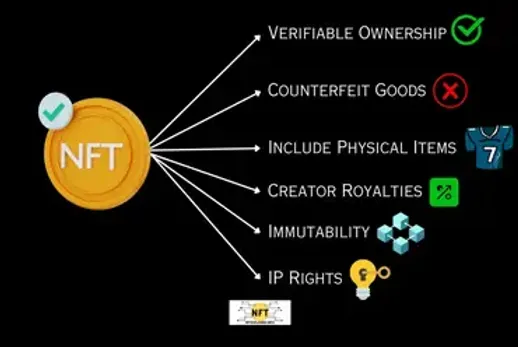NFTs Unveiled: The Digital Keys to Owning the Unownable
In recent years, you’ve probably heard about NFTs making headlines, from record-breaking art sales to viral memes being tokenized. But what exactly are NFTs, and how are they changing the way we think about ownership in the digital age? In this blog, we’ll explore the fascinating world of NFTs, their real-life applications, as well as the challenges and controversies that accompany them.
What is an NFT? NFT stands for Non-Fungible Token. At its core, it’s a digital certificate of ownership for something unique in the digital realm. Unlike cryptocurrencies like Bitcoin or Ethereum, which are interchangeable and have the same value, NFTs represent ownership of a specific, irreplaceable item. They’re like digital deeds, proving you own a one-of-a-kind piece of the digital world.
Real-Life Uses of NFTs:
- Digital Art: NFTs are revolutionizing the art world by allowing artists to create and sell digital art as unique, collectible items. This opens up new opportunities for artists to monetize their work and gain greater control over their creations.
- Music: Musicians and producers are using NFTs to sell exclusive music tracks, concert tickets, and even ownership shares of their albums. NFTs offer a direct connection between artists and their fans.
- Virtual Real Estate: In the world of virtual reality and online gaming, NFTs are used to buy and sell virtual land and property. This is changing how people perceive ownership in digital environments.
- Collectibles: Everything from virtual trading cards to in-game items can be tokenized as NFTs, allowing collectors to prove ownership and trade their digital collectibles.
- Authentication and Provenance: NFTs provide a secure way to prove the authenticity and ownership history of physical and digital assets, such as luxury goods, real estate, and historical artifacts.
Challenges and Concerns:
- Environmental Impact: Some NFTs are criticized for their energy consumption, particularly those built on blockchains that use proof-of-work (PoW) algorithms. This has led to concerns about their carbon footprint.
- Copyright and Plagiarism: NFTs have raised concerns about copyright infringement and the potential for unauthorized tokenization of others’ work.
- Market Volatility: The NFT market can be highly speculative, with prices soaring and crashing. This poses risks to both buyers and sellers.
- Lack of Regulation: The NFT space is relatively unregulated, which can lead to fraudulent activities and scams.
Conclusion NFTs have unlocked a world of possibilities in the digital realm, from empowering artists to changing how we buy and sell virtual assets. They’re redefining the concept of ownership in the age of the internet. However, they’re not without their challenges and controversies, including environmental concerns and copyright issues. As the NFT space continues to evolve, finding the right balance between innovation and responsible usage will be key to shaping its future. NFTs are much more than just digital keys; they’re transforming the way we own and trade in the digital world.

